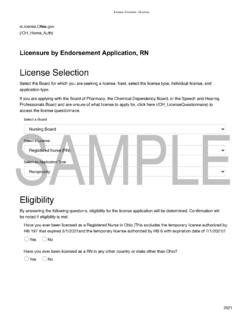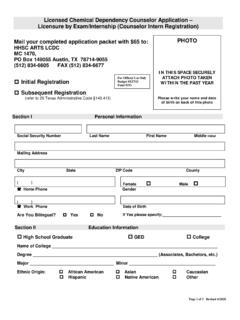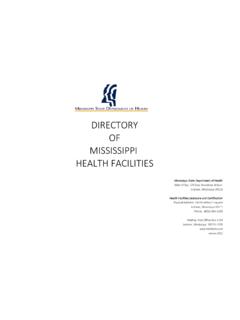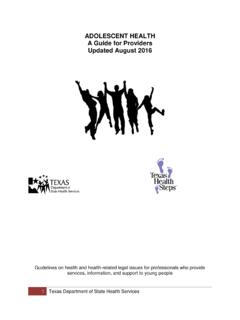Transcription of EXPLANATION OF BLEND
1 Arizona Revised Statutes effective August 3, 2018 Page 1 L A W S Arizona Revised Statutes Title 32 Professions and Occupations Chapter 33 Behavioral Health Professionals Article 1 Board of Behavioral Health Examiners 32-3251. Definitions 32-3252. Board of behavioral health examiners; appointment; qualifications; terms; compensation; immunity; training program 32-3253. Powers and duties 32-3254. Board of behavioral health examiners fund 32-3255. Executive director; compensation; duties 32-3256. Executive director; complaints; dismissal; review 32-3257. Written notifications and communications; methods of transmission Article 2 Academic Review Committees 32-3261. Academic review committees; members; appointment; qualifications; terms; compensation; immunity; training Article 3 Licensure 32-3271. Exceptions to licensure; jurisdiction 32-3272. Fees 32-3273. License renewal; continuing education 32-3274. Licensure by endorsement 32-3275. Requirements for licensure; withdrawal of application 32-3276.
2 Notice of address and telephone number changes; penalties 32-3277. Expired licenses; reinstatement 32-3278. Inactive license 32-3279. Probationary and temporary licenses 32-3280. Fingerprinting Article 4 Regulation 32-3281. Disciplinary action; investigations; hearings; civil penalty; timely complaints; burden of proof 32-3282. Right to examine and copy evidence; summoning witnesses and documents; taking testimony; right to counsel; confidentiality 32-3283. Confidential relationship; privileged communications; clients with legal guardians; treatment decisions 32-3284. Cease and desist orders; injunctions 32-3285. Judicial review 32-3286. Unlawful practice; unlawful use of title; violation; classification; civil penalty; exception Article 5 Social Work 32-3291. Licensed baccalaureate social worker; licensure; qualifications; supervision 32-3292. Licensed master social worker; licensure; qualifications; supervision 32-3293. Licensed clinical social worker; licensure; qualifications Article 6 Counseling 32-3301.
3 Licensed professional counselor; licensure; requirements Arizona Revised Statutes effective August 3, 2018 Page 2 32-3303. Licensed associate counselor; licensure; requirements; supervision Article 7 Marriage and Family Therapy 32-3311. Licensed marriage and family therapist; licensure; qualifications 32-3313. Licensed associate marriage and family therapist; licensure; requirements; supervision Article 8 Substance Abuse Counseling 32-3321. Licensed substance abuse technician; licensed associate substance abuse counselor; licensed independent substance abuse counselor; licensure; qualifications; supervision Arizona Revised Statutes effective August 3, 2018 Page 3 ARTICLE 1 BOARD OF BEHAVIORAL HEALTH EXAMINERS 32-3251. Definitions In this chapter, unless the context otherwise requires: 1. "Board" means the board of behavioral health examiners. 2. "Client" means a patient who receives behavioral health services from a person licensed pursuant to this chapter.
4 3. "Direct client contact" means, the performance of therapeutic or clinical functions related to the applicant's professional practice level of psychotherapy that includes diagnosis, assessment and treatment and that may include psychoeducation for mental, emotional and behavioral disorders based primarily on verbal or nonverbal communications and intervention with, and in the presence of, one or more clients. 4. "Equivalent" means comparable in content and quality but not identical. 5. "Indirect client service" means training for, and the performance of, functions of an applicant's professional practice level in preparation for or on behalf of a client for whom direct client contact functions are also performed, including case consultation and receipt of clinical supervision. Indirect client service does not include the provision of psychoeducation. 6. "Letter of concern" means a nondisciplinary written document sent by the board to notify a licensee that, while there is insufficient evidence to support disciplinary action, the board believes that continuation of the activities that led to the investigation may result in further board action against the licensee.
5 7. "Licensee" means a person who is licensed pursuant to this chapter. 8. "Practice of behavioral health" means the practice of marriage and family therapy, professional counseling, social work and substance abuse counseling pursuant to this chapter. 9. "Practice of marriage and family therapy" means the professional application of family systems theories, principles and techniques to treat interpersonal relationship issues and nervous, mental and emotional disorders that are cognitive, affective or behavioral. The practice of marriage and family therapy includes: (a) Assessment, appraisal and diagnosis. (b) The use of psychotherapy for the purpose of evaluation, diagnosis and treatment of individuals, couples, families and groups. 10. "Practice of professional counseling" means the professional application of mental health, psychological and human development theories, principles and techniques to: (a) Facilitate human development and adjustment throughout the human life span.
6 (b) Assess and facilitate career development. (c) Treat interpersonal relationship issues and nervous, mental and emotional disorders that are cognitive, affective or behavioral. (d) Manage symptoms of mental illness. (e) Assess, appraise, evaluate, diagnose and treat individuals, couples, families and groups through the use of psychotherapy. 11. "Practice of social work" means the professional application of social work theories, principles, methods and techniques to: (a) Treat mental, behavioral and emotional disorders. (b) Assist individuals, families, groups and communities to enhance or restore the ability to function physically, socially, emotionally, mentally and economically. (c) Assess, appraise, diagnose, evaluate and treat individuals, couples, families and groups through the use of psychotherapy. 12. "Practice of substance abuse counseling" means the professional application of general counseling theories, principles and techniques as specifically adapted, based on research and clinical experience, to the specialized needs and characteristics of persons who are experiencing substance abuse, chemical dependency and related problems and to the families of those persons.
7 The practice of substance abuse counseling includes the following as they relate to substance abuse and chemical dependency issues: (a) Assessment, appraisal and diagnosis. (b) The use of psychotherapy for the purpose of evaluation, diagnosis and treatment of individuals, couples, families and groups. 13. "Psychoeducation" means the education of a client as part of a treatment process that provides the client with information regarding mental health, emotional disorders or behavioral health. 14. "Psychotherapy" means a variety of treatment methods developing out of generally accepted theories about human behavior and development. 15. "Telepractice" means providing behavioral health services through interactive audio, video or electronic communication that occurs between the behavioral health professional and the client, including any electronic communication for evaluation, diagnosis and treatment, including distance counseling, in a secure platform, and that meets the requirements of telemedicine pursuant to section 36-3602.
8 Arizona Revised Statutes effective August 3, 2018 Page 4 16. "Unprofessional conduct" includes the following, whether occurring in this state or elsewhere: (a) Being convicted of a felony. Conviction by a court of competent jurisdiction or a plea of no contest is conclusive evidence of the conviction. (b) Using fraud or deceit in connection with rendering services as a licensee or in establishing qualifications pursuant to this chapter. (c) Making any oral or written misrepresentation of a fact: (i) To secure or attempt to secure the issuance or renewal of a license. (ii) In any statements provided during an investigation or disciplinary proceeding by the board. (iii) Regarding the licensee's skills or the value of any treatment provided or to be provided. (d) Making any false, fraudulent or deceptive statement connected with the practice of behavioral health, including false or misleading advertising by the licensee or the licensee's staff or a representative compensated by the licensee.
9 (e) Securing or attempting to secure the issuance or renewal of a license by knowingly taking advantage of the mistake of another person or the board. (f) Engaging in active habitual intemperance in the use of alcohol or active habitual substance abuse. (g) Using a controlled substance that is not prescribed for use during a prescribed course of treatment. (h) Obtaining a fee by fraud, deceit or misrepresentation. (i) Aiding or abetting a person who is not licensed pursuant to this chapter to purport to be a licensed behavioral health professional in this state. (j) Engaging in conduct that the board determines is gross negligence or repeated negligence in the licensee's profession. (k) Engaging in any conduct or practice that is contrary to recognized standards of ethics in the behavioral health profession or that constitutes a danger to the health, welfare or safety of a client. (l) Engaging in any conduct, practice or condition that impairs the ability of the licensee to safely and competently practice the licensee's profession.
10 (m) Engaging or offering to engage as a licensee in activities that are not congruent with the licensee's professional education, training or experience. (n) Failing to comply with or violating, attempting to violate or assisting in or abetting the violation of any provision of this chapter, any rule adopted pursuant to this chapter, any lawful order of the board, or any formal order, consent agreement, term of probation or stipulated agreement issued under this chapter. (o) Failing to furnish information within a specified time to the board or its investigators or representatives if legally requested by the board. (p) Failing to conform to minimum practice standards as developed by the board. (q) Failing or refusing to maintain adequate records of behavioral health services provided to a client. (r) Providing behavioral health services that are clinically unjustified or unsafe or otherwise engaging in activities as a licensee that are unprofessional by current standards of practice.







